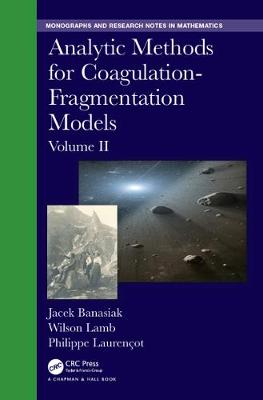Chapman & Hall/CRC Monographs and Research Notes in Mathematics
3 total works
Analytic Methods for Coagulation-Fragmentation Models, Volume I
by Jacek Banasiak, Wilson Lamb, and Philippe Laurencot
Analytic Methods for Coagulation-Fragmentation Models is a two-volume set that provides a comprehensive exposition of the mathematical analysis of coagulation-fragmentation models. Initially, an in-depth survey of coagulation-fragmentation processes is presented, together with an account of relevant early results obtained on the associated model equations. These provide motivation for the subsequent detailed treatment of more up-to-date investigations which have led to significant theoretical developments on topics such as solvability and the long-term behaviour of solutions. To make the account as self-contained as possible, the mathematical tools that feature prominently in these modern treatments are introduced at appropriate places. The main theme of Volume I is the analysis of linear fragmentation models, with Volume II devoted to processes that involve the nonlinear contribution of coagulation.
Features of Volume I:
- The main models of the theory together with their derivations and early methods of solution
- A detailed presentation of the operator theoretical methods and semigroup theory that play an essential role in the theory of fragmentation processes
- A comprehensive theory of fragmentation processes, including fragmentation with growth and decay in both the discrete and continuous particle size cases
- An analytical explanation of the `pathologies' of the fragmentation equation, such as the shattering phase transition and non-uniqueness of solutions
- An analysis of the long-term dynamics of the discrete size fragmentation equation with growth
Analytic Methods for Coagulation-Fragmentation Models, Volume II
by Jacek Banasiak, Wilson Lamb, and Philippe Laurencot
Analytic Methods for Coagulation-Fragmentation Models is a two-volume set that provides a comprehensive exposition of the mathematical analysis of coagulation-fragmentation models. Initially, an in-depth survey of coagulation-fragmentation processes is presented, together with an account of relevant early results obtained on the associated model equations. These provide motivation for the subsequent detailed treatment of more up-to-date investigations which have led to significant theoretical developments on topics such as solvability and the long-term behaviour of solutions. To make the account as self-contained as possible, the mathematical tools that feature prominently in these modern treatments are introduced at appropriate places. The main theme of Volume I is the analysis of linear fragmentation models, with Volume II devoted to processes that involve the nonlinear contribution of coagulation.
Features of Volume II:
- A primer on weak compactness in L 1 and dynamical systems
- A comprehensive theory of solvability of the coagulation-fragmentation equation by both the semigroup and weak compactness methods, including a thorough analysis of the gelation and shattering phenomena
- A detailed analysis of the long-term dynamics of the coagulation-fragmentation equations with a state-of-the-art discussion on self-similar solutions
Analytic Methods for Coagulation-Fragmentation Models, Volume I & II
by Jacek Banasiak, Wilson Lamb, and Philippe Laurencot
Analytic Methods for Coagulation-Fragmentation Models is a two-volume that provides a comprehensive exposition of the mathematical analysis of coagulation-fragmentation models. Initially, an in-depth survey of coagulation-fragmentation processes is presented, together with an account of relevant early results obtained on the associated model equations. These provide motivation for the subsequent detailed treatment of more up-to-date investigations which have led to significant theoretical developments on topics such as solvability and the long-term behaviour of solutions. To make the account as self-contained as possible, the mathematical tools that feature prominently in these modern treatments are introduced at appropriate places. The main theme of Volume I is the analysis of linear fragmentation models, with Volume II devoted to processes that involve the nonlinear contribution of coagulation.
Features:
- Provides a comprehensive and up-to-date survey of knowledge and important results in the field, and brings together two different deterministic analytical approaches for solving the fundamental coagulation-fragmentation equations
-
- Presents a state-of-the-art analysis of the long-term dynamics of the models
-
- Offers an analytic explanation of phase transitions such as shattering and gelation, appearing for the first time in a book form
-
- Includes a self-contained survey of essential mathematical tools from kinetic theory, with applications to specific, but nontrivial, examples of coagulation-fragmentation theory
-
- Provides a link between phenomenological results obtained in applied and technological sciences and rigorous mathematical theory


